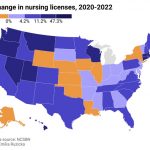The Next Generation: New Nurses Have More Options, More Burnout
 Nurses entering the workforce have access to more job opportunities than prior generations, putting many in a position to seek more specialized roles and higher pay. At the same time, nurses who received the bulk of their training during the COVID-19 pandemic have less hands-on experience, which can make them more prone to burning out.
Nurses entering the workforce have access to more job opportunities than prior generations, putting many in a position to seek more specialized roles and higher pay. At the same time, nurses who received the bulk of their training during the COVID-19 pandemic have less hands-on experience, which can make them more prone to burning out.
As experienced nurses retire and new ones come aboard, employers are offering competitive pay, career development opportunities and individualized support to recruit and retain clinicians.
“Nurses will stay where they feel valued, where they feel like they belong and where they feel like they’re being helped to develop their nursing practice and their professional career,” said Ken White, dean of the MGH Institute of Health Professions School of Nursing in Boston.
More choices, higher pay
Nurses entering the field over the past few years have had a wider array of options—particularly in primary care and community health—as employers across the sector try to fill open positions.
“Even within the last 15 years, the trend was that you had to get your feet wet in a traditional medical surgical-type unit or an entry-level clinical area to develop expertise,” said Lisa O’Connor, senior managing director and co-leader of FTI Consulting’s healthcare practice and former chief nursing officer at Boston Medical Center. “What has changed is that training programs and fellowships for new nurses have provided them the opportunity to work in sub-specialized areas of care right out of school.”
Because they have more choices, younger nurses typically do not have the same loyalty to organizations as older nurses do and tend to move around to find the best practice environment, White said.
A 2023 survey of 100 senior health system executives conducted by hiring platform Incredible Health found that 54% of nurses classified as “younger” by respondents are seeking more specialized roles, versus 14% of older nurses.
Younger nurses are also more likely to request increases in compensation, the survey found. Salaries for entry-level nurses vary by state, health system and travel agency—as well as whether a workplace is unionized, which tends to mean higher pay. But wages for nurses have increased overall: The national median salary for a registered nurse was $81,220 in 2022, compared with $71,730 in 2018, according to data from the Bureau of Labor Statistics.
BJC HealthCare looks to offer market-competitive salaries, especially when it comes to attracting new graduates, said Tommye Austin, senior vice president for patient care systems and chief nurse executive at BJC HealthCare. About a quarter of registered nurses at St. Louis-based BJC have two years of experience or fewer. Last year, nurses from the 2022 graduating class accounted for about half of the system’s external hires.
“Maybe 10, 15 years ago, a nurse would go to an organization just based on reputation,” Austin said. “That’s not the case anymore. They don’t care about reputation. They care about ‘What is going to be my starting salary and how can I best make the salary dollar like my peer down the street?’”
Some professional organizations have pushed for reimbursement boosts so health system employers can continue to raise nursing salaries and keep up with inflation.
“We’ve asked the federal government and the Centers for Medicaid and Medicare Services to look at the Medicare wage index,” said Jennifer Mensik Kennedy, president of the American Nurses Association. “They need to address that, because if [organizations] are going to pay nurses more, they’re going to need to be reimbursed differently.”
While New Hyde Park, New York-based Northwell Health said it also offers competitive pay, the health system considers its opportunities for professional development and mentorship to be its biggest draw for newer nurses, according to Launette Woolforde, chief nursing officer of its Manhattan hospitals and care sites. Around 70% of Northwell’s annual nursing hires have less than a year of experience, she said.
The system encourages younger nurses to participate in specialized orientation fellowships for areas like critical care and pediatrics, continuing education workshops, shared governance councils and residency programs that focus on delegation, communication, patient experience and the care continuum, Woolforde said.
Retaining new graduates
Despite the perks of competitive salaries and specialized positions, some recent nursing graduates are still dealing with the lingering effects of the COVID-19 pandemic. Many had fewer opportunities for clinical experience as students during the public health emergency, which can lead to burnout on the job.
Rates of stress and fatigue are the most pronounced among nurses under 25 years old, with 69% of them saying they have been suffering from burnout, compared with 30% of nurses older than 25, according to a 2022 survey by the American Nurses Foundation.
“Even though we can turn out more nurses from nursing schools, they’re not quite ready to assume positions in intensive care units and critical care settings that require more extensive experience,” White said. “They need more support from their managers and organizations in terms of how they deal with compassion fatigue and workload.”
This lack of experience is an issue as health systems deal with higher-acuity patients and as nursing veterans exit the workforce, White said.
It has taken BJC HealthCare more hours of onboarding in the past few years to get new nurse employees accustomed to caring for a full patient load and assimilated with peers, Austin said. The health system is working to customize its orientation sessions and reduce administrative and documentation burdens, she said.
The organization employs nurse educators, preceptors and virtual nurses to provide support for new graduates and offers scholarships and earn-as-you-learn programs for nurses to continue their professional development. It has also created its own in-house flexible scheduling app.
“We work to ensure that … people feel that they are in a great environment where they can ask questions, grow, learn, develop,” Austin said. “We also encourage self-care so that individuals can come back with resilience on a weekly basis.”
The Vizient and American Association of Colleges of Nursing residency program, created in 2002, works with more than 700 employers to provide mentorship, stress management tips and other resources to more than 30,000 nurses.
Vizient uses the feedback it gathers from nursing residents to improve its programs and inform health systems on how to create more desirable work cultures, said Evy Olson, the consulting company’s vice president of nursing programs.
“You have to ask these new nurses what’s important to them,” Olson said, pointing to work-life balance, flexible scheduling and mentorship as a few examples. “And then you have to listen. You have to think about how we can make those things happen.”
(This story originally appeared in Modern Healthcare.)




